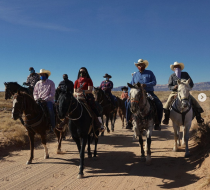Ride to the Polls Favorite
On Friday, 30-year-old activist Allie Young will lead a group of trail riders through Navajo Nation to help voters cast their ballots in the 2020 election on the last day of early voting in Arizona.
Young, a citizen of the Diné, or Navajo Nation, has been leading voter registration and other voting and census efforts throughout Indian Country through her organization Protect the Sacred.
Young says it was actually her dad’s idea to organize the trail rides. He felt frustrated by the contentious political cycle and wasn’t feeling motivated to vote in the election. However, he shared with Young that he had a vision of a group of riders traveling by horseback to the polls, which energized him and could help mobilize others, as well.
So last week, Young led her first “Ride to the Polls” effort and gathered a group of residents to cast their votes early. “Our Indigenous children across the country are feeling the urge to connect with our culture more than ever,” Young says. “We thought this was a great way for them to feel inspired and motivated to vote in honor of our ancestors who rode longer miles to make their voices heard by voting at the polls.”
“Rodeo culture is big in Native communities,” she adds, “so that’s something that gets people out whether it’s bull riding, a rodeo or trail ride.”
Riders are required to wear a mask and practice social distance, fortunately an easier task while on a horse.
Young sees connecting the culture of trail riding to the act of voting as an opportunity to engage Native American youth in her community, who are both the most Western-educated generation of Native Americans but also face extreme barriers to representation.
“Our youth are incredible. They’re the ones who started Standing Rock, which became a worldwide movement,” Young tells CNBC Make It, speaking of the movement opposing the construction of the Dakota Access pipeline. “That just shows the power of Native voices. Our Native youth are more educated than ever in terms of Westernized education, and they have more of an urge to connect our cultures than ever before.
With that said, “there’s a resistance to the colonial system that has never worked for us,” Young continues. “In part I’ve had to say, ‘Yes, I agree with you,’ but at the same time, this election is too important to sit out.” Young urges voters to exercise their right for representation on the issues that hit closest to home, many of which were laid bare during the coronavirus pandemic, such as a lack of quality health care; water infrastructure; broadband internet and electricity; and federal assistance to combat the health and economic consequences of the virus.
Young says her community is also concerned about climate change, and she supports candidates who are focused on sustaining employment while limiting industries that destroy natural resources, such as coal mining and fracking.
Engaging in the election also pays tribute those who have died from the coronavirus this year, Young adds. “I’m reminding my community: Let’s remember what our elders have been through during this pandemic — the elders who lost their lives and are not able to vote.”
‘We’ve often been left out of the conversation completely, but I’m hopeful that is changing’
Barriers to voting have long existed for Native Americans.
Native Americans were legally named U.S. citizens in 1924, and their right to vote in U.S. elections in every state wasn’t recognized until 1962, when Utah became the last to remove formal barriers.
“We’ve often been left out of the conversation completely, but I’m hopeful that is changing as we move forward,” Young says. “We’re excited to participate in this election to make our voices heard.”
By Jennifer Liu
CNBC
Wed, Oct 28 2020







